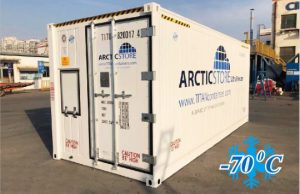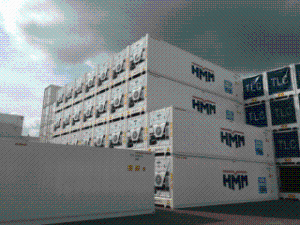In the realm of containerized shipping and storage, the distinction between deep freezer containers and standard refrigerated containers is crucial for industries ranging from food and pharmaceuticals to chemical and biotechnological sectors. Both types of containers serve the fundamental purpose of preserving perishable goods, but their designs, capabilities, and applications vary significantly. This article delves into the intricate differences between deep freezer containers and standard refrigerated containers, exploring their construction, operational parameters, and optimal use cases.
Introduction to Refrigerated Containers
Refrigerated containers, commonly known as reefers, are indispensable in global logistics for maintaining temperature-sensitive cargo during transportation. These containers rely on refrigeration units integrated into their structure to regulate temperatures, ensuring goods remain within specified temperature ranges. Typically used for chilled products like fruits, vegetables, dairy, and pharmaceuticals, standard reefers offer versatility in maintaining temperatures above freezing point up to moderate cold storage temperatures.

Understanding Deep Freezer Containers
On the other hand, it caters to goods requiring ultra-low temperatures, often below freezing, for prolonged periods. Unlike standard reefers that primarily maintain temperatures above freezing, they are engineered with enhanced insulation and powerful refrigeration systems capable of sustaining sub-zero temperatures consistently. This capability makes them ideal for transporting and storing goods such as seafood, meats, ice cream, biomedical materials, and certain chemicals that demand stringent temperature controls to preserve quality and safety.
Key Differences in Design and Construction
- Insulation and Thermal Efficiency
One of the primary distinctions lies in insulation thickness and efficiency. Deep freezer containers feature thicker insulation layers than standard reefers, reducing heat transfer and maintaining colder internal temperatures more effectively. This enhanced insulation ensures minimal temperature fluctuations even in extreme environmental conditions, crucial for long-distance transport and extended storage durations.
- Refrigeration Systems
Standard reefers typically employ refrigeration units optimized for maintaining temperatures between +25°C to -25°C (-13°F to +77°F), using air cooling or direct expansion (DX) systems. In contrast, they utilize more robust refrigeration systems capable of achieving and sustaining temperatures as low as -60°C (-76°F) or lower. These systems often integrate advanced technologies like cascade refrigeration or cryogenic cooling methods to meet stringent deep freezing requirements reliably.
- Temperature Control Precision
Precision in temperature control is another critical factor distinguishing deep freezer containers. While standard reefers provide accurate temperature control within a specified range, they offer finer temperature adjustments to maintain ultra-low temperatures precisely. This capability ensures optimal conditions for goods sensitive to even slight variations in temperature, such as biological samples, vaccines, and high-value frozen foods.
Applications and Industry Utilization
- Food Industry
Deep freezer containers play a vital role in the frozen food supply chain, facilitating the transport of seafood, meats, frozen fruits, and specialty frozen products. Their ability to maintain ultra-low temperatures ensures food safety and quality integrity from production facilities to distribution centers and retail outlets worldwide.
- Pharmaceutical and Biomedical Applications
In pharmaceutical logistics, they are indispensable for transporting vaccines, biological samples, and medical supplies requiring deep freezing temperatures to maintain efficacy and regulatory compliance. Biotechnological sectors also rely on these containers for preserving enzymes, cell cultures, and other sensitive biological materials during research and production processes.
- Chemical and Industrial Uses
Certain chemicals and industrial materials necessitate deep freezing conditions for stability and safety. They provide a controlled environment for transporting and storing chemicals, reagents, and specialty materials used in research, manufacturing, and industrial applications where temperature-sensitive properties must be preserved.

Operational Considerations and Efficiency
- Energy Consumption
Due to their heightened insulation and refrigeration requirements, deep freezer containers typically consume more energy than standard reefers. Efficient energy management and advanced refrigeration technologies mitigate operational costs and environmental impacts, balancing energy efficiency with optimal performance.
- Container Compatibility and Handling
Both types of containers are standardized in size and compatible with various transport modes, including ships, trucks, and rail. Handling procedures for deep freezer containers may require specialized equipment and protocols to ensure seamless loading, unloading, and storage in facilities equipped to handle ultra-low temperatures safely.
Conclusion: Choosing the Right Container for Your Needs
In conclusion, the choice between deep freezer containers and standard refrigerated containers hinges on specific logistical requirements and the nature of the cargo being transported or stored. While standard reefers suffice for most chilled and moderately frozen goods, they are indispensable for ultra-low temperature applications demanding precise temperature control and prolonged storage at freezing or below. Understanding these distinctions enables industries to optimize logistics strategies, ensuring the integrity, safety, and quality of temperature-sensitive products across global supply chains.
Future Trends and Innovations
Looking ahead, advancements in insulation materials, refrigeration technologies, and digital monitoring systems will continue to enhance efficiency and reliability. Innovations such as IoT-enabled temperature monitoring and sustainable refrigerants aim to further improve operational sustainability and reduce environmental footprint, shaping the future of cold chain logistics in a rapidly evolving global economy.
Call to Action
For industries navigating complex logistics challenges involving temperature-sensitive cargo, consulting with experts in containerized shipping and refrigeration solutions is paramount. Stay informed about emerging technologies and best practices to optimize cold chain management and ensure compliance with evolving regulatory standards.
This comprehensive exploration underscores the critical role of deep freezer containers in modern logistics, emphasizing their specialized capabilities and the strategic considerations guiding their deployment across diverse industries. As global trade continues to expand and evolve, the reliance on advanced cold chain solutions like deep freezer containers will only grow, driving innovation and efficiency in preserving the quality and safety of perishable goods worldwide.
CIMC Yang Zhou Base is a leading manufacturer of deep freezer containers and various other standard and special logistics equipment. With years of experience in the industry, it focuses on the design, production and distribution of high-quality innovative products that meet the specific needs of customers.
If you need high-quality and innovative logistics equipment, including refrigerated containers, cold chain equipment, containerized equipment integration, modular buildings, etc., База CIMC Ян Чжоу is your best choice. Welcome inquiries from customers all over the world and look forward to the opportunity to cooperate with you.


